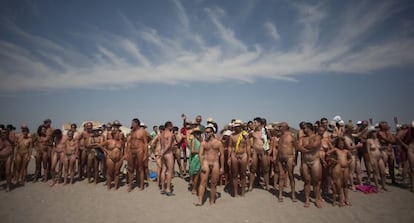Almería naturist haven bans nudity
But officials in town of Vera claim it was a drafting mistake and that new law will be reviewed soon

The coast of Vera, in Almería, has been a haven for nudists in Spain since 1979, when the government first allowed the practice on the beach. But now, Vera’s identity is under threat. A new law passed by the council two weeks ago sets fines of €100 to €300 for people who go naked or topless.
The law prospered thanks to support from the conservative Popular Party. The Socialists abstained from the vote and the regional Partido Andalucista group voted against the move.
But the local government is now saying that the whole thing was “a mistake” that will soon be rectified at a future council meeting.
The controversy has erupted just days before the first anniversary of an event in the town that set a new Guinness World Record: on July 21 last year, 729 people went for a collective skinny dip on the beach at Vera. The initiative was begun by the town hall, in partnership with the Spanish Federation of Naturism.
But the new regulation leaves no room for interpretation, laying out fines for “promoting or circulating topless or without clothes in public areas referred to in this ordinance.” The law does mention one exception to the rule, “item 6 in article 58,” but there is in fact no article 58.
Juan de la Cruz Belmonte, the deputy mayor, claims that the error arose when they based their legislation “on ordinances from other municipalities.” He says the complete legislation with the exceptions included will be taken back to the council. “It was a transcription mistake not to include item 58.6. But I have issued orders to include an exception for the whole part of Vera beach that is nudist, including its streets and residential estates, where people go naked.”
But Félix Rodríguez, who manages one of the biggest nudist estates in the area, Parque Vera 3, says there were no mistakes.
“There were two plenary sessions, one to provisionally approve the ordinance, and one to give it the final approval. At no point did they contact the owner associations or ask residents what they thought of this ordinance. The exception has not even been drafted, and in any case it should have been a result of consensus between authorities and homeowners.”
The exception has not even been drafted, and in any case it should have been a result of consensus with locals”
Félix Rodríguez, manager of a Vera nudist estate
Rodríguez is forecasting “the beginning of problems” because of this new legislation.
But Marisa Jiménez, a member of the naturist association Natural World and co-organizer of the world record event last year, believes that it was an unintentional mistake.
“The city was at Fitur [a major tourism fair] this year with a campaign called Vera Naturalmente; it also encouraged the Guinness record and put up signs reminding passers-by about the nudist area,” she says. “That is why we feel that this is a mistake that is going to be corrected.”
The Socialist spokeswoman in Vera council, Isabel de Haro, who abstained from the vote, criticizes the fact that the government did not take other political forces into account when it drafted the ordinance. “It regulates important issues such as when to take out the garbage, but some parts of it are very unspecific, such as the banning of drinking on the streets, without mentioning the fact that they are referring to alcoholic drinks. That is why we abstained,” she explains.
For now, the legislation has not gone into effect as it has yet to be published in the official provincial gazette. The city is avoiding this until the text goes back to the council for review.
Tu suscripción se está usando en otro dispositivo
¿Quieres añadir otro usuario a tu suscripción?
Si continúas leyendo en este dispositivo, no se podrá leer en el otro.
FlechaTu suscripción se está usando en otro dispositivo y solo puedes acceder a EL PAÍS desde un dispositivo a la vez.
Si quieres compartir tu cuenta, cambia tu suscripción a la modalidad Premium, así podrás añadir otro usuario. Cada uno accederá con su propia cuenta de email, lo que os permitirá personalizar vuestra experiencia en EL PAÍS.
¿Tienes una suscripción de empresa? Accede aquí para contratar más cuentas.
En el caso de no saber quién está usando tu cuenta, te recomendamos cambiar tu contraseña aquí.
Si decides continuar compartiendo tu cuenta, este mensaje se mostrará en tu dispositivo y en el de la otra persona que está usando tu cuenta de forma indefinida, afectando a tu experiencia de lectura. Puedes consultar aquí los términos y condiciones de la suscripción digital.








































